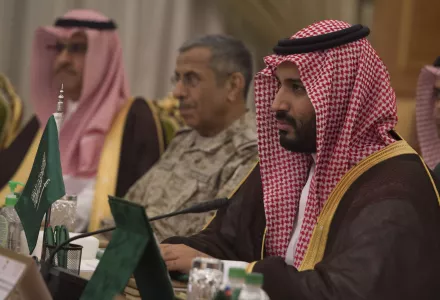
Saudi Arabia's new leadership views Iran’s continued destabilization of the region, through increased sectarianism and growing support to terrorist proxies, as untenable. The new Crown Prince, Mohammed bin Salman (MBS), has demonstrated an unprecedented willingness to decisively address this issue to preserve regional stability, security and prosperity.
Saudi Arabia and Iran have long been neighbors, but the neighborhood is changing. Before the Iranian revolution, the great game of regional political competition and gamesmanship was framed by realist rivalry, not sectarian ideology and terrorism. However, the rules of the game were unilaterally changed in 1979 when the revolution overran Iran, and Khomeini imposed his radical Valiyet-e-Faqih dogma. In so doing, he usurped and exploited peaceful Shi’ism from within, thereby abandoning centuries of established tradition and scholarship. Although successful in Persian Iran, his ideas would struggle to find favor in Arab Shiite clerical circles, which tended to view them as self-serving political theatre focused on securing his domestic standing.
The tectonic shockwaves of Khomeini’s revolution reverberated across the region, including with extremist Sunni groups. On 1 February 1979, Khomeini arrived in Tehran. On 4 November, his followers attacked the US Embassy taking 52 American diplomats hostage for 444 days. This further radicalized the revolution, and was an early example of what Al-Qaeda would later perfect and call the Management of Savagery. Just two weeks later, on 20 November, a messianic terrorist group inspired by this chaos, preaching the end of the world, occupied the Holy Mosque in Mecca. This unprecedented event brought terrorism to Saudi Arabia for the first time and left hundreds of dead. However, this was only the start of the Iranian storm. In subsequent decades, far more negative repercussions were to follow.
“Export the revolution” became the rallying cry for those empowered by their success in Iran, but embittered by regional and international reaction. Criticism of Iran’s failing political economy would be deflected by calls to attack external enemies to revive imagined historic glories. Tehran would seek to defeat the Great Satan and its key regional ally, Saudi Arabia, in a war of a million cuts. The prize of regional hegemony and eventual control of Mecca and Medina being worthy of such risk. Like Al-Qaeda and ISIL, Khomeini recognized that an Islamic State or Caliphate, Shiite or Sunni, would look hollow without the Two Holy places. To this end, Khomeinists would devastatingly deploy two intertwined strategies. First, they would seek to radicalise peaceful Shiite minorities across the region, and grow loyal terrorist militias: a parasitic protection racket premised on the destruction of national identities, ironically promoted by a state-sponsor. Second, existential effort would be applied to delegitimise the ‘Wahabis’ of Saudi Arabia, specifically the Royal family who have held unbroken court for almost 300 years. In an extraordinarily ambitious distortion, Tehran would portray Saudi Arabia as un-Islamic: to Shia audiences the Kingdom would be the enemy par-excellence, whist Sunni audiences were to be convinced the nation was either not Sunni enough or not Sunni at all.
Iran would share its desire for dominance of the Two Holy places with Sunni terrorist organisations. Both would strive to undermine stability, security and prosperity. From the 1983 slaughter by suicide attack of 241 US and 58 French peacekeepers in Beirut, to the 1996 murder of 19 Americans in al-Khobar, the Iranian security services and their terrorist proxies would wreak havoc. Even the annual Hajj pilgrimage would be targeted to raise sectarian tension and incite violence. Al-Qaeda would target the ‘far enemy,’ whilst Iranian proxies would exorcise the Great Satan from the Middle East. Given this overlapping agenda, it is unsurprising that Iran has been willing to provide Al-Qaeda in the post 9/11 world with safe-haven and safe passage through its territory; in addition to training and funding elements of the Taliban, and allowing ISIL to remain unchecked in Syria while simultaneously battling them in Iraq. Moreover, Iran has aggressively used its state infrastructure to undertake international terrorism, thankfully, however badly. From its 2011 plot to assassinate the Saudi Ambassador to the US, to myriad escapades as far flung as South East Asia, West Africa and South America. Within the Middle East, Iran’s meddling in Iraq, Syria, Lebanon, Bahrain, Yemen and parts of Saudi Arabia’s Eastern province is increasingly well-known and understood. Underpinning these activities is a sorry cocktail of exploited and misled Shiite communities, extremist ideology peddled as religious loyalty to Iran, and active criminal networks.
With continued Iranian provocation and aggression, Saudi Arabia's 35 years of strategic patience looks increasingly hard to justify. The status quo of further Iranian destabilization of the Middle East is untenable. Given that the first responsibility of any government is to protect its sovereignty and the safety of its citizens, the new Saudi leadership is rightly decisive and determined to challenge Iranian aggression. Saudi support for the legitimate and sovereign governments of Yemen and Bahrain illustrate this commitment. Without such difficult decisions, Iranian meddling might very well have collapsed further parts of the region permanently. As Crown Prince and Minister of Defence Mohammed bin Salman (MBS) recently said, “dialogue is important but only when matched by facts on the ground.” The generational game of unilateral Iranian brinkmanship and bazaar politics, at the expense of security, is over.
MBS is prepared to meet the Iranian challenge head on if necessary. He has purposefully not ruled out any options. Although the principles of Saudi foreign policy remain true to the ideals of the Saudi state, MBS has demonstrated an unprecedented willingness to grasp the mantle of regional stability and check Tehran’s trajectory of terror. The new Saudi leadership calls on the entire world to ostracize Iran until it changes course, and to stand shoulder to shoulder with Saudi Arabia as it confronts this reality. Like all Saudis, MBS hopes and prays for the best, whilst being prepared to take a firm stand against the worst. It behooves the international community to follow his example.
